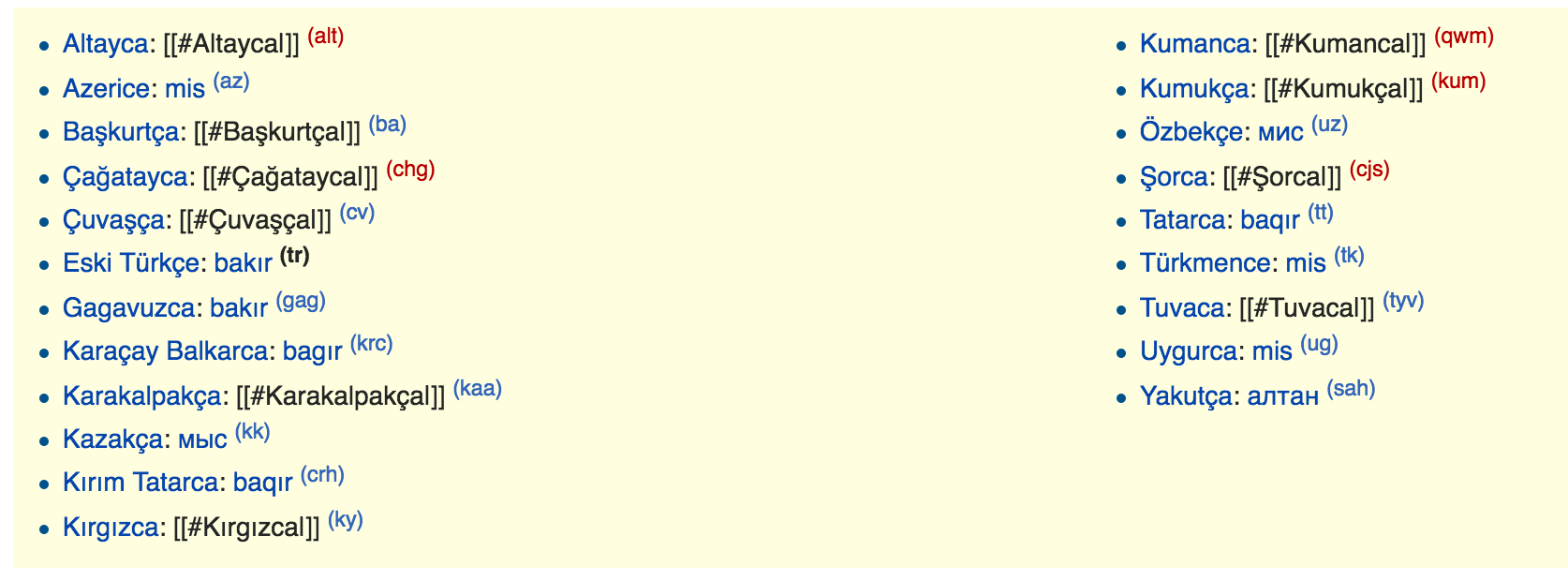I've been looking for a good explanation on the origin of the turkish word bakır, but I can't find much on it. Is it a loan or is it really a Turkic word for copper?
-
Until there is a Turkish language specific SE site, I feel this is on-topic here.– MitchCommented Sep 29, 2016 at 15:18
-
@Mitch: For me to understand better, why do some believe this should be closed? For being irrelevant (to this site's concept) or because it has been answered?– MidasCommented Oct 1, 2016 at 9:15
2 Answers
There is no evidence that bakır comes from any other living language family, and cognates of it are present in many other Turkic languages.
Yakut uses the Turkic root for gold, many major Turkic languages use the Iranic word مس (mis) and a few others жез, джез (compare Mongolian зэс).
bakır was borrowed into Balkan languages from Ottoman Turkish. In any case, although the etymology is opaque, it has been in Turkic for a very long time.
Incidentally, the city now known by some as Diyarbakır had nothing to do with bakır. It was explicitly renamed to as part of 20th century Turkification policies, from Ottoman Diyâr-ı Bekr itself from Arabic Diyaru Bakr, after the occupying Bakr tribe. The actual Aramaic and Greek name is Amida, Kurdish Amed, in Armenian Tigranakert.
-
Thank you very much! Before I mark this question as the solution, I would like to ask one more thing, just in case... The reason why I asked this question is because I was evaluating some (computational) algorithms that help linguists to identify cognates. In a test between Turkic and Indo-European I was expecting a low score on my list, which I got. However, bakιr specifically gave a possitive score due to a phonetic "alignment" (Kondrak's algorithm) with copper et sim. Hence, I wondered whether there is a possibility of a "saturated" loan that resulted the current form in Turkic languages.– MidasCommented Sep 20, 2016 at 13:53
-
2The etymological answer: the (Central European, Latin) etymology of copper is well known and not so ancient, and it has hardly travelled East, so it is frankly impossible that it would not be found in any Greek, Armenian or Iranic sources and then suddenly show up in diverse Turkic languages. The statistical answer: such methods inevitably yield some coincidences but they should be understood at most as candidates. Especially misleading would be using English as a proxy for Indo-European and Istanbul Turkish as a proxy for Turkic, as they are both outliers within their respective families. Commented Sep 20, 2016 at 18:33
-
@A.M.Bittlingmayer, the etymology of copper is ultimately Greek, not Latin -- it's from the name of the island of Cyprus. (Still no plausible relation with the Turkic word, of course.)– TKRCommented Jan 24, 2017 at 23:06
-
1If a distinction can be made, it did not refer to the metal in Greek, that shift happened in Latin. And the root of Cyprus like those of many Hellenic toponyms is thought to be pre-Greek. Commented Jan 25, 2017 at 8:29
-
Bakr, as in Diyarbakır, is an old Arabic tribal name. It is not connected with the Turkish word for "copper".– fdbCommented Dec 9, 2018 at 10:27
The root is not known. But for etymology I would recommend Misalli Büyük Türkçe Sözlük (It is online on kubbealtilugati.com .
According to it, bakır has been used since the old Turkic, but there are some claims that it can be loan word from an Iranian Language (Sogdian maybe?)
Source: http://lugatim.com/s/bakIr
